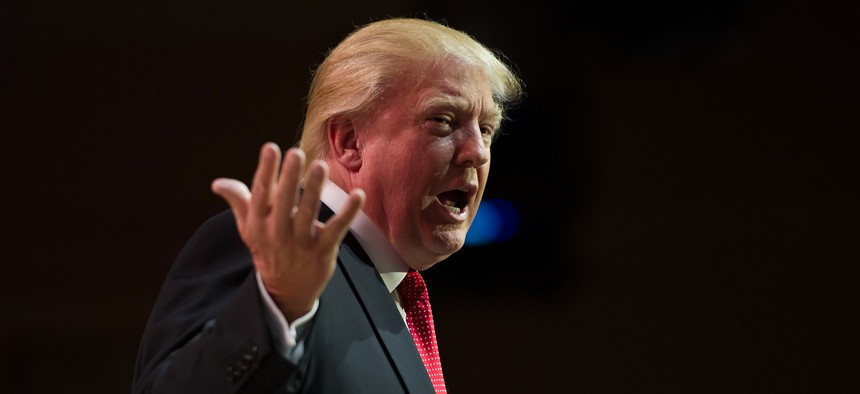
Christopher Halloran / Shutterstock.com
The Story Behind the Strange Government Ethics Tweets Singing Donald Trump’s Praises
"Get all of these tweets posted as soon as humanly possible."
An attention-grabbing tweet storm from the US government’s ethics watchdog about Donald Trump’s conflicts of interest turns out to have been written by its director—but even Twitter employees feared that the account had been hacked.
On November 30, the official Twitter account of the Office of Government Ethics let loose with a stream of downright Trumpian tweets, congratulating the president-elect for deciding to divest himself from his business holdings to avoid conflicts of interest. There was only problem: Trump hadn’t actually decided to do that.
.@realDonaldTrump - we told your counsel we'd sing your praises if you divested, we meant it.
— U.S. OGE (@OfficeGovEthics) November 30, 2016
.@realDonaldTrump Bravo! Only way to resolve these conflicts of interest is to divest . Good call!
— U.S. OGE (@OfficeGovEthics) November 30, 2016
Observers immediately wondered if the official account had been hacked or tampered with, especially when they were deleted and, hours later, re-posted. Now, thanks to documents released to Quartz under the Freedom of Information Act, we know a little bit more of the circumstances around the tweets. For one, they were written by the agency’s director, Walter Shaub, Jr., who asked his chief of staff to make them public “ASAP.” In a follow-up, he wrote, “Get all of these tweets posted as soon as humanly possible.”

While an OGE spokesperson would not comment further on the circumstances of the tweet, they appear to come in response to an early a.m. series of tweets from Trump himself, who claimed he would “be leaving my great business in total,” with further explanation coming at a Dec. 15 press conference. But that press conference would be cancelled, and Trump and his team have yet to confirm any plans to totally divest the wealthy builder from his businesses.
Records show that public response to the tweets was swift, with reporters clamoring to know what was happening and citizens expressing their disappointment with the office for praising Trump before he had taken real action to diminish his conflicts.
“What exactly was the intent of these bizarre tweets? What could they possibly accomplish?” one e-mailer wrote. “I fear that you have damaged this office’s integrity and have added doubt in the minds of this country’s citizens that you will be impartial and effective over the next 4 years.”
Jared Benoff, an employee in Twitter’s Washington, DC office, e-mailed the agency to make sure that its tweets were, in fact, intentional. An OGE attorney quickly replied, “I can confirm that the agency’s Twitter account was not compromised. We have issued an official statement regarding the activity on the account.”

That November statement reads, in part:
“Divestiture resolves conflicts of interest in a way that transferring control does not. We don’t know the details of their plan, but we are willing and eager to help them with it. The tweets that OGE posted today were responding only to the public statement that the president-elect made on his Twitter feed about his plans regarding conflicts of interest. OGE’s tweets were not based on any information about the president-elect’s plans beyond what was shared on his Twitter feed.”
That doesn’t explain why the agency decided to praise Trump without awaiting details of his plan, which still haven’t been released. Shaub and his staff have diligently pushed for Trump to separate himself fully from his companies. After the OGE tweets went out, Shaub sent a statement praising Trump’s comments about leaving his business to the president-elect’s transition counsel, Donald McGahn.
Shaub’s effort to reach out to Trump directly through his beloved medium, however, may quickly have been seen as mistake, judging by the reversed decision to delete the tweets.
A month later, the question of whether Trump will actually divest from his businesses—which ethics experts say is the only way to eliminate the conflicts of interest that continue to dog his transition into the White House—still remains open.
NEXT STORY: Why Trump's Conflicts of Interest Matter







